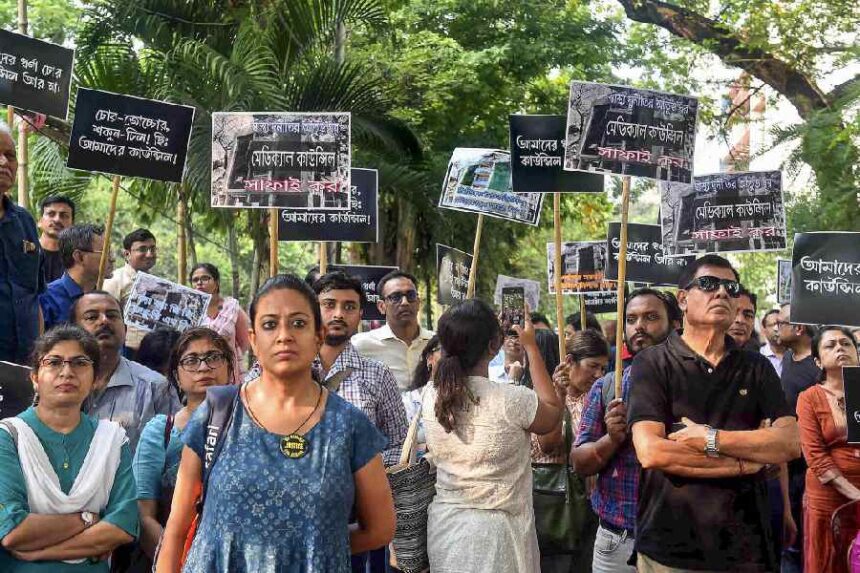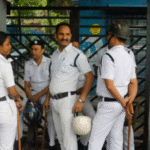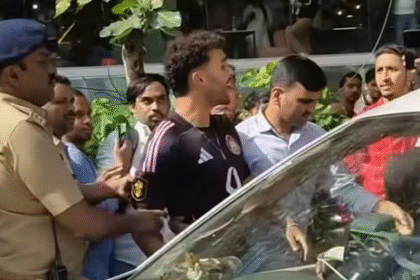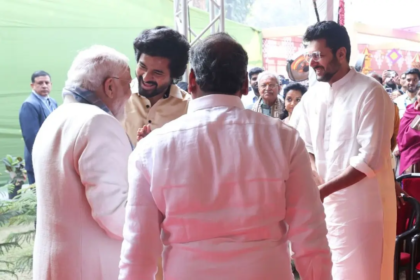TMC Student Union Dominates Bengal College Polls Amid Opposition Concerns
Earlier this month, the Calcutta high court asked the Bengal government to lock union rooms in colleges and universities where there is no recognised student body or where no student body elections had taken place in the recent past.
A crime against a woman prompted the petition and direction.
Ten months after the rape and murder of a young doctor at the R.G. Kar Medical College and Hospital shocked the state, the gang-rape of a 24-year-old student at the South Calcutta Law College has once again stunned all.
Like the earlier crime, this too has gone some way in exposing the systemic rot in Bengal’s higher educational institutions and renewed demands for accountability. Most of all, it unveiled the question of whether the ruling Trinamool Congress, its leaders and supporters, are running a parallel rule in the state’s colleges.
In both cases – at R.G. Kar and the law college – the accused have had close links to the Trinamool Chhatra Parishad (TMCP), the student wing of the TMC.
Much can be said about the impunity enjoyed by these politically affiliated leaders on campus. At present, Bengal social media and media spaces are flush with footage depicting lawlessness, physical and verbal violence and sexual crimes in colleges.
Manojit Mishra, the prime accused in the law college case, has been named in at least 10 police complaints, including ones levelling serious allegations of stabbing and molestation. Yet, despite this, he was appointed as a contractual employee at the institution, reportedly on the recommendation of the college’s governing body, chaired by a senior TMC MLA, Asok Deb.
“Shouldn’t those involved in student politics be allowed to work? Should they remain unemployed?” asked Deb. Mishra, according to reports, addresses Deb as “jyethu” or uncle.
Elections
The systematic rot in West Bengal’s education system has roots stretching back to 2013. In February 2013, the fatal shooting of police sub-inspector Tapas Choudhury during student union elections at Harimohan Ghosh College in Kolkata, allegedly by a TMCP-linked gunman, prompted the TMC government to suspend all such elections. This was followed by the death of the 22-year-old Rabindra Bharati University student and Students Federation of India leader Sudipto Gupta in police custody after Gupta participated in a protest against the freeze in April 2013.
Despite occasional polls in some institutions between 2013 and 2016 – which were mostly won by the TMCP – a complete campus-wide democratic process never resumed. In the absence of such elections, colleges have seen takeovers – sometimes violent – by affiliates of the ruling party.
In 2015, Krishna Prasad Jana, a member of Chhatra Parishad, the Congress students’ wing, was murdered in Sabang College in Paschim Medinipur, allegedly by TMCP supporters. The assault and forced resignation of the principal of the Raiganj University, an MLA, Arabul Islam, throwing a water jug at a teacher in Bhangar College, and TMCP vandalism at Presidency University following a defeat marked the quick slide in this regard.
“Those who murdered our party worker are now observing Martyrs’ Day and even forcing the martyr’s family to stand with them. Earlier, when other parties were in power in West Bengal, such coercive politics of poaching and intimidation never existed,” said Priyanka Choudhury, state president of the Chhatra Parishad.
‘Union fees’ and ‘leaders’ quota’
In 2012, Shibashis Bandyopadhyay, then a principal of Rampurhat College in Birbhum fell ill after a violent attack by TMCP supporters in the college premises. He soon applied for a transfer to another college.
Speaking to The Wire, he said, “Principals are now sandwiched between politics and responsibility. Local MLAs’ nominees run colleges. Governing body presidents used to be elected, now they are appointed. We’re forced into compromises. If we object, we’re either beaten, harassed, or suspended. Many principals are currently suspended. Even speaking out is seen as a crime. But how long can we stay silent?”
The accountability vacuum created by the election freeze has fuelled rampant corruption. During this time, lines within the TMCP have deepened and infighting has been rampant over ‘profits’ from corrupt practices like charging money to facilitate admissions admissions.
In 2018, this crisis reached a breaking point with a student dying by suicide amidst a flood of extortion complaints, compelling the Mamata Banerjee government to promise to revamp the state’s college admissions system.
“In 2015, aside from regular fees, I paid Rs 100 in ‘union fees’, along with library and cycle stand charges, an extra Rs 700 in total. Later, we were told that getting Honours seats was nearly impossible unless we accessed the ‘leaders’ quota’. That opened the door to big-money deals. Multiply this across hundreds of students annually, and the total unofficial income is enormous,” shared Mrinmoy Biswas, a student from Ranaghat in the Nadia district.
The extent to which these unions enjoy unbridled financial powers with little accountability became evident in an incident still remembered in Kolkata circles. In 2022, celebrated singer KK (Krishna Kumar Kunnath) tragically died of a heart attack just hours after performing at Kolkata’s Nazrul Mancha. Witnesses described severe overcrowding at the venue, with the audience size exceeding double its capacity. The strain overwhelmed the air-conditioning system, creating suffocating conditions — something KK himself reportedly mentioned during the performance.
The event was organised under the banner of the TMCP unit of Gurudas College, which unofficially controls its student union. Although the unit claimed that the college and students funded the fest, and not the union, critical questions remained unanswered. Without formal college elections, how did the ruling party’s student wing gain access to such funds? Who permitted them to manage the event and handle finances with such autonomy?
‘Temporary,’ says education minister
“TMCP leaders, empowered to organise student groups, have turned into plunderers. I’ve faced brutal attacks for opposing their corruption. This is a full-blown syndicate. They control honours seat allocations and quotas, are adept at fund embezzlement, and even appoint themselves as non-teaching staff via governing bodies. They profit from every avenue possible and are even pocketing construction commissions, and more,” said former SFI leader Pratikur Rahman.
In the last decade, a clear pattern of politicised appointments has emerged across West Bengal’s higher education institutions. Former leaders of the the ruling party’s student wing have been systematically rewarded with administrative and non-teaching jobs. At Ashutosh College, a powerful TMCP leader, Sarthak Banerjee, became head clerk, and the former general secretary became the college accountant. Surendranath College saw at least four similar appointments. This trend extends statewide, with former TMCP general secretaries and leaders securing positions as non-teaching or even academic staff at colleges.
“The appointments made in colleges are temporary and have no long-term future. The state is now focusing on initiating student union elections in colleges,” state education minister Bratya Basu told The Wire.
But Keshab Bhattacharya, state secretary of the Left-affiliated college teachers’ organisation West Bengal College And University Teachers Association disagrees.
“The ruling party decides who represents the faculty. They even install handpicked alumni onto governing bodies. Where opposition is weak or absent, the ruling party becomes its own opponent. The educational environment is being destroyed. If teacher representatives don’t align politically, they’re harassed,” said Bhattacharya.
A brief democratic interlude occurred in early 2020 when four universities – Jadavpur, Presidency, Rabindra Bharati, and IIEST Shibpur – were allowed to hold student union elections after agitations. The results were telling. Left-affiliated alliances swept Jadavpur, with TMCP finishing a distant fourth. Similarly, independent and Left-leaning groups dominated Presidency. These outcomes indicate that the TMCP’s influence can significantly diminish in democratic exercises on campuses a fact that likely explains the ruling party’s persistent reluctance to restore routine student elections statewide.
Also Read: ₹25 Lakh Gurgaon Apartment Hit by Extreme Rain: 3-Foot Waterlog Submerges Home in Luxury Society








